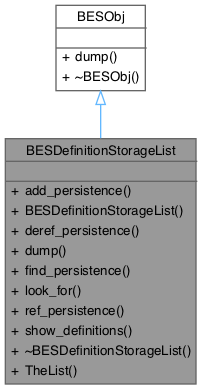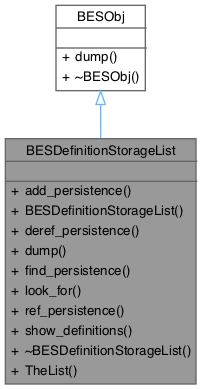Provides a mechanism for accessing definitions from different definition stores registered with this server. More...
#include <BESDefinitionStorageList.h>


Public Member Functions | |
| virtual bool | add_persistence (BESDefinitionStorage *p) |
| virtual bool | deref_persistence (const std::string &persist_name) |
| virtual void | dump (std::ostream &strm) const |
| dump the contents of this object to the specified ostream | |
| virtual BESDefinitionStorage * | find_persistence (const std::string &persist_name) |
| virtual BESDefine * | look_for (const std::string &def_name) |
| virtual bool | ref_persistence (const std::string &persist_name) |
| virtual void | show_definitions (BESInfo &info) |
Static Public Member Functions | |
| static BESDefinitionStorageList * | TheList () |
Detailed Description
Provides a mechanism for accessing definitions from different definition stores registered with this server.
This class provides a mechanism for users to access definitions from different definition stores, such as from a MySQL database, a file, or volatile stores.
Users can add different BESDefinitionStorage instances to this persistent list. Then, when a user looks for a definition, that search goes through the list of persistent stores in the order they were added to this list.
- See also
- BESDefinitionStorage
- BESDefine
- BESDefinitionStorageException
Definition at line 70 of file BESDefinitionStorageList.h.
Member Function Documentation
◆ dump()
|
virtual |
dump the contents of this object to the specified ostream
This method is implemented by all derived classes to dump their contents, in other words, any state they might have, private variables, etc...
The inline function below can be used to dump the contents of an OPeNDAPObj object. For example, the object Animal is derived from BESObj. A user could do the following:
Animal *a = new dog( "Sparky" ) ; cout << a << endl ;
And the dump method for dog could display the name passed into the constructor, the (this) pointer of the object, etc...
- Parameters
-
strm C++ i/o stream to dump the object to
Implements BESObj.
The documentation for this class was generated from the following file: